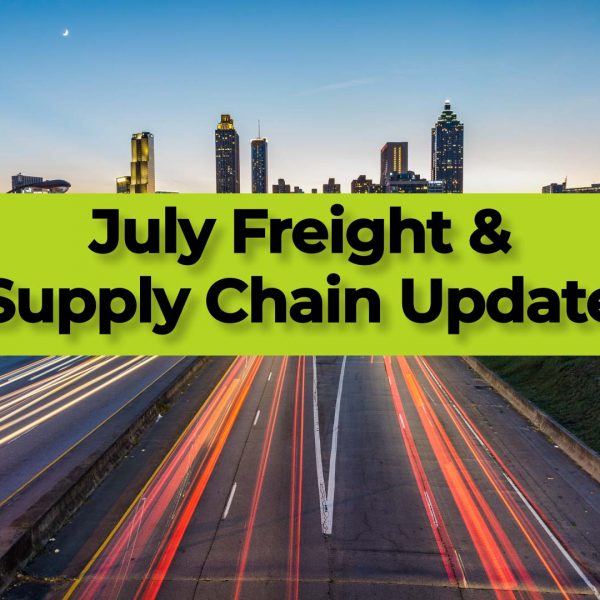Technology adoption in the logistics industry has lagged behind many other fields until recently. However, over the last few years there has been a constant stream of new technology products and offerings for supply chain management and logistics operations.
Incorporating technology into your logistics processes can create drastic efficiency gains and cost reductions as you streamline processes and the data provided by analytics while saving your team time not having to manually perform as many repetitive tasks.
While a lot of media coverage has been focused on driver less trucks, drone delivery and block chain applications within the transportation industry, none of these technologies are currently available and some might be years from being deployed within the industry. We wanted to focus on a few core technologies that are currently available that should be integrated into any supply chain.
Here are a few ways you should be taking advantage and adopting current technology within the supply chain and logistics market to make your operation more efficient.
1. Shipment tracking
Shipment tracking has improved dramatically with the increased availability of low cost GPS devices giving shippers and BCOs the ability to quickly and easily verify the location of their freight as well as check on delivery times and potential delays.
Many shippers still rely on making phone calls to their carriers or drivers in order to receive tracking updates and adjust their expected delivery time accordingly, this is immense waste of time for both the shipper and the carrier. With the current offering of tracking apps and automated email notifications, a shipper should strongly consider requiring the carriers they work with to have some sort of automated tracking alert system or an online web based shipment tracking portal. Not only will you save time simply finding out where your cargo is without having to constantly be making phone calls, but you can better coordinate your dock teams to be ready for the arrival of your freight.
2. Transportation Management Systems
Transportation management systems can encompass many features but overall provide a web based platform to organize and manage your freight, for many shippers this is directly tied into inventory/warehouse management. TMS systems are a great way for shippers to better organize and consolidate their inventory levels and freight movements to one easy to use computer system. Many TMS systems provide document management for shipment documents and shipment management tools.
Less than 30% of shippers are using TMS systems within their businesses to coordinate inventory levels and shipments, instead relying on spreadsheets and decentralized documents and data.
The amount of time and money a TMS will save you can be dramatic, simply by organizing all your logistics and supply information into one system makes the management of documents and shipments much easier, less error prone and more efficient.
3. Data Analytics
As technology adoption has leap forward within the logistics industry, the collection of shipment related data has also increased dramatically to the point that even small shippers can now take advantage of data driven decision making much in the same way that larger shippers can.
Data collection and analysis of each lane and mode selection over the course of a year can provide meaningful insights into the most cost effective and most reliable service offerings available. Combining shipping data with required inventory levels from tracking your inventory turn closely can yield significant supply chain service and cost improvements.
4. Digital Access to capacity
Many shippers still rely on email or phone calls to book a load with their carriers once they determine a shipment is ready. This often results in a disjointed and time intensive approach to executing your shipment plan.
Newer digitally enabled logistics providers have changed the game by offering a full digital platform to not only book loads, but also provide comprehensive shipment analytics as well as tracking information. Effectively this lets the shipper spend less time on basic tasks that can be easily automated and focus more on optimizing their supply chain with the easily accessible data.
5. Digital Payments and Payment Management
Incorporating your accounting and supply chain costs recording into your TMS system or digital platform can easily let you track supply chain spend across shipment lanes and analyze costs down to the SKU.
Digital logistics providers also make payment processing easy with cloud based invoice management tools and an easy to use payment portal, reducing the time spent on accounts payable. For small businesses in particular the ability to pay transportation invoices online can be a major time saver.
Technology will continue to be more widely adopted and deployed within the supply chain and logistics fields. While self driving trucks and drone delivery services are still years away from wide spread introduction, these technologies are available now and will represent an immediate improvement to your supply chain.
If you would like help or guidance with creating a more efficient supply chain or logistics plan, let us know, we are happy to help analyze your supply chain for potential savings as well as helping you incorporate the latest tech offerings into your logistics operation.
About Zmodal
Zmodal is a digitally enabled third-party multimodal logistics provider delivering intermodal, trucking and supply chain services via our own digital intermodal platform powered by our proprietary technology, all focused on giving you the service to make your company grow!




Comment